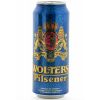Hofbrauhaus Wolters - Pilsener
-
ABV:
4.9% -
Bottle Size:
500-ml -
Serving Temperature:
40-45° F -
Suggested Glassware:
Pilsner Glass or Flute
It’s worth noting before we begin that it is acceptable to spell the name of this style of beer as “pilsner” or “pilsener.” The style originated in Pilsen, Czech Republic, but of course the Czechs spell Pilsen as “Plzeň,” so perhaps we should consider another spelling: “plzener.” Oh well, enough of that – on to the beer! Wolters Pilsener was awarded a Gold Medal in 2018 from Germany’s extremely stringent DLG Test which, over the course of three months, subjects beers not only to expert blind tasting, but also an array of scientific tests. On the pour, Wolters Pilsener presents a crystal clear, bright straw color with a fluffy bright white head. On the nose expect pale, crackery malt aromas, notes of hay, and a grassy and lightly floral noble hop character. In the mouth we found this brew light bodied and crisp with a nice, soft bite from the carbonation. The mildly floral and grassy hop aromas come through on the palate too, in perfect balance with the light pale malt sweetness hinting toward white bread dough. We found it went great with grilled chicken sandwiches covered in pepper jack cheese, bacon, and tomato. Enjoy!
The story behind Hofbrauhaus Wolters reaches as far back as 1627, when Zaccharis Boiling received approval to begin brewing and selling beer in Brunswick, Germany. In 1734, Heinrich Levin Wolters came into control of the brewery, lending his name to the operation and starting a dynasty that would last through six generations of Wolters family brewers. The Wolters brewery has been a landmark in the city for hundreds of years, with the Duke of Brunswick even selecting Wolters as the official beer supplier to his court (and in fact, the brewery adopted the Dukedom of Brunswick’s coat-of-arms as their logo, which you can see on their labels to this day).
Like so many other breweries across Europe, Wolters endured an extremely difficult and dark time during World War II. Large portions of the city of Brunswick were wiped out by Allied bombing raids, and the brewery suffered extensive damage. Fortunately for the brewery and all the residents of the city, after the war Brunswick was located within West Germany. While many breweries in East Germany languished under communist government control, Wolters managed to not only resume operations, but to grow their business and modernize their brewing operations significantly. The brewery was reconstructed in 1947, and a large renovation and modernization effort in 1976 transformed Wolters into a world-class brewing facility. In 2003 Wolters was acquired by brewing conglomerate InBev, but the marriage didn’t last long. By 2006 Wolters had split from InBev, re-emerging as a private brewery in control of its own fate once again – a healthy development in our opinion in a world increasingly dominated by mega brewers like InBev (which went on to merge with Anheuser-Busch in 2008).
As a long-established regional brewery and sponsor of local beer festivals, Wolters has traditionally focused their marketing efforts and growth targets in the greater Lower Saxony region in an approximately 50 mile radius from Brunswick. However, in recent years they’ve begun exporting their beers (essentially taking on their former InBev owners, who had effectively shut down Wolters’ previous export business in favor of their big international brands). Within just the first two years they established export markets in diverse countries around the world including the U.S., China, Lithuania, Ireland, Romania, and Mexico. Their success is testament to the quality of traditional German beer, and proves there’s a thirsty public out there that demands the good stuff. Prost!

Unmatched Variety by style, brewery & country
Choose from Five different Beer Clubs offering unmatched variety by brewery,
country of origin, and beer style to suit your specific tastes.


